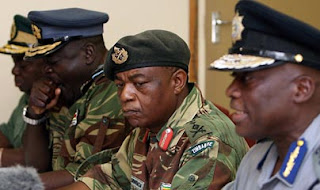ISRAELI ELECTION RIIGING MACHINE EXPOSED!
NIKUV
International, a shadowy Israeli intelligence company allegedly hired by Zanu
PF to rig the forthcoming general elections through manipulation of the voters’
roll, has a checkered history in the region, as it was dragged to court in
Zambia on allegations of tampering with voter registration to rig polls,
Zambian court records show. Zambian
court documents obtained this week by the Zimbabwe Independent –– which first
reported on Nikuv’s role in local electoral activities in 2000 –– show that
although former Zambian Chief Justice Matthew Ngulube dismissed the application
by the United National Independence Party and Liberal Progressive Front in 1996
on the technical grounds that the voter registration was legally conducted by
the electoral commission, not by the Israeli firm as claimed, the allegations
left Nikuv’s reputation badly dented. Nikuv, which was embroiled in a
controversial US$6,9 million contract in which under clause 2. l on page 85 it
was to supply government with up to four million voters cards although it
eventually only registered 2,5 million people in Zambia, has been involved in
shady voter registration activities in Zimbabwe for some years now.
Zimbabwe’s
recent voter registration exercise was chaotic and the voters’ roll is in a
shambles ahead of elections on July 31, raising fears of ballot rigging and
theft. In the Zambian situation then, as is the case in Zimbabwe now, Nikuv was
accused of being contracted to manipulate and rig the elections from the voters
registration exercise to the declaration of results. The applicants argued the
company was hired to rig the electoral process to retain the then ruling
Movement for Multiparty Democracy (MMD) in power. The decision to approach
Nikuv had been made by MMD in a bid to secure re-election in 1996 after the
party under the leadership of the late president Frederick Chiluba had defeated
founding leader Kenneth Kaunda in 1991 during the first multiparty elections in
the country.
However, the
applicants argued that the contract, signed by the vice-president’s office and
designed to rig elections in favour of MMD, was “unlawful” as it violated the
Electoral Act and Zambia National Tender Board Act. They also charged it ousted
the jurisdiction of the Zambian Electoral Commission. A government technical
committee was appointed by the government to work with Nikuv, effectively
sidelining the electoral commission. Nikuv has been working with Registrar
General Tobaiwa Muede’s office amid claims it has been manipulating the voters’
roll to help President Robert Mugabe and Zanu PF to rig elections 2000. Prime
Minister Morgan Tsvangirai questioned Nikuv’s role during a meeting he held
with Zimbabwe Electoral Commission (Zec) chairperson Justice Rita Makarau and
her deputy Joyce Kazembe three weeks ago. He charged
that Zanu PF, through the Registrar General office, was working with the
secretive Israeli company to tamper with the voters’ roll, which Zec has also
admitted is in a shambles.
Tsvangirai’s
spokesperson Luke Tamborinyoka said the premier had asked Zec to investigate
the role played by Nikuv in the voter registration exercise. The Zambian
parties which took Nikuv to court wanted, among other things, an order of
certiorari (an order by a higher court directing a lower court, tribunal, or
public authority to send a record in a given case for review) quashing the
decision by the Zambian government to award the contract of registration of
voters to Nikuv and another order prohibiting the electoral commission and the
director of elections from delegating its function to register voters to Nikuv.
They also
wanted an order making it clear Nikuv is not entitled to conduct the
registration of voters in Zambia; that the said contract be declared null and
void; that the said contract was wrongly classified as “secret” by the Zambian
government and that the registration of voters exercise being conducted under
the direction Nikuv be halted forthwith and that the said registration be
declared null and void as it was a violation of the laws of Zambia.
The
applicants further wanted an order of prohibition to bar the Electoral
Commission and the Director of Elections from delegating its functions to
register voters to Nikuv and also an order of mandamus (an order instructing a
public body to do or to refrain from doing some specific act which it is
obliged to do under law) that the Electoral Commission be ordered to direct and
supervise the registration of voters and the compilation of an updated voters’
register for the conduct of elections later that year. Nikuv International –
which was then called Nikuv Computers – had signed a contract with the Zambian
government in November 1995 to supply it with up to four million voter cards at
a cost of US$6 870 000.
The contract
Nikuv to compile an up-to-date registration of voters, something applicants
argued was in breach of the Zambian constitution and the Electoral Act which
state that the electoral commission should be the major player in the
registration of voters and conduct of elections. When
questioned by the Supreme Court, Nikuv’s project manager Gershom Korda
confirmed his company had been awarded a contract but because he knew it was
known the firm was not registered, he chose not to give evidence to avoid cross
examination. Despite the order being dismissed on technical grounds, the case
left Nikuv’s image tainted as it became notorious all over Africa as an
elections rigging machine which many incumbents and their governments,
including in Zimbabwe, resort to when they desperately need to win elections to
ensure political survival.


Comments